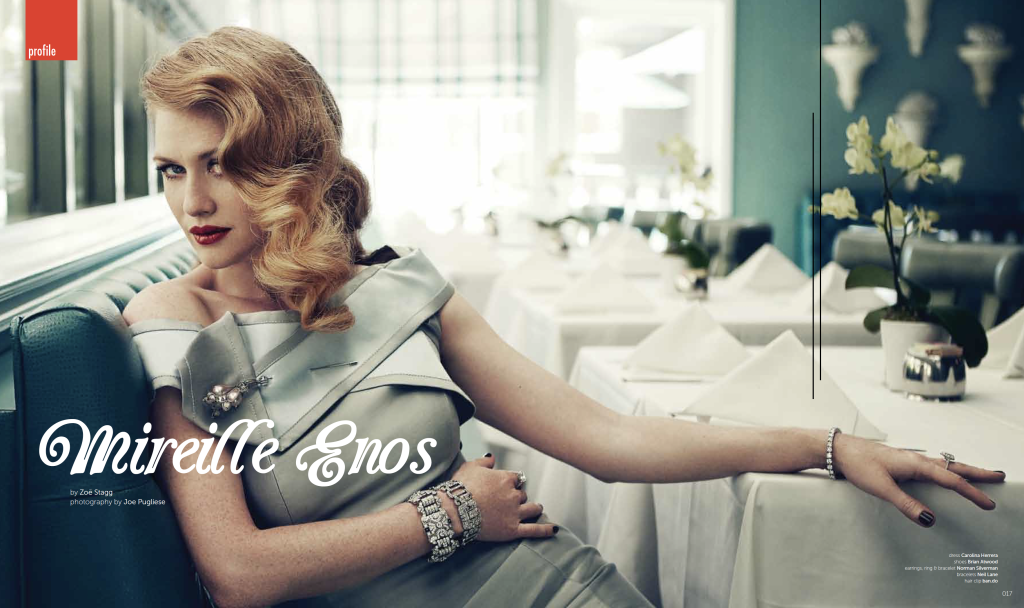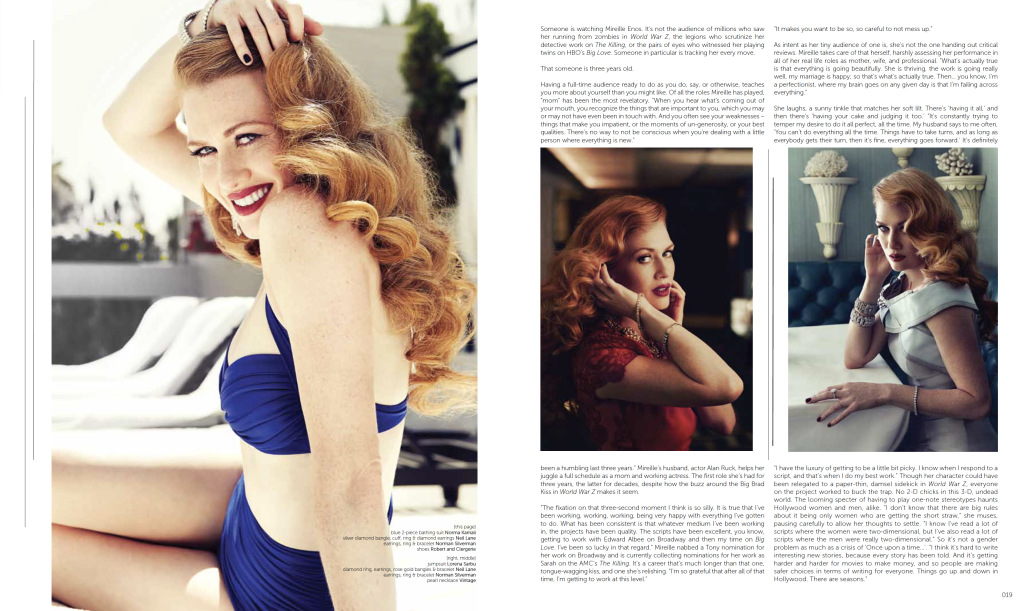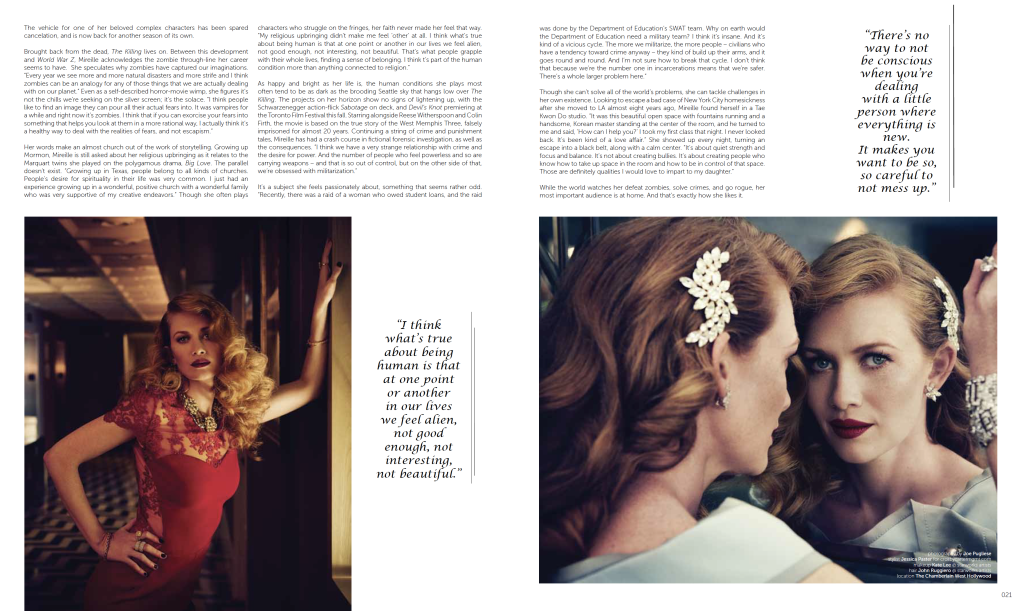
By: Zoë Stagg
Photography: Joe Pugliese
Someone is watching Mireille Enos. It’s not the audience of millions who saw her running from zombies in World War Z, the legions who scrutinize her detective work on The Killing, or the pairs of eyes who witnessed her playing twins on HBO’s Big Love. Someone in particular is tracking her every move.
That someone is three years old.
Having a full-time audience ready to do as you do, say, or otherwise, teaches you more about yourself than you might like. Of all the roles Mireille has played, “mom” has been the most revelatory. “When you hear what’s coming out of your mouth, you recognize the things that are important to you, which you may or may not have even been in touch with. And you often see your weaknesses – things that make you impatient, or the moments of un-generosity, or your best qualities. There’s no way to not be conscious when you’re dealing with a little person where everything is new.”
“It makes you want to be so, so careful to not mess up.”
As intent as her tiny audience of one is, she’s not the one handing out critical reviews. Mireille takes care of that herself, harshly assessing her performance in all of her real life roles as mother, wife, and professional. “What’s actually true is that everything is going beautifully. She is thriving, the work is going really well, my marriage is happy; so that’s what’s actually true. Then… you know, I’m a perfectionist, where my brain goes on any given day is that I’m failing across everything.”
She laughs, a sunny tinkle that matches her soft lilt. There’s ‘having it all,’ and then there’s ‘having your cake and judging it too.’ “It’s constantly trying to temper my desire to do it all perfect, all the time. My husband says to me often, ‘You can’t do everything all the time. Things have to take turns, and as long as everybody gets their turn, then it’s fine, everything goes forward.’ It’s definitely been a humbling last three years.” Mireille’s husband, actor Alan Ruck, helps her juggle a full schedule as a mom and working actress. The first role she’s had for three years, the latter for decades, despite how the buzz around the Big Brad Kiss in World War Z makes it seem.
“The fixation on that three-second moment I think is so silly. It is true that I’ve been working, working, working, being very happy with everything I’ve gotten to do. What has been consistent is that whatever medium I’ve been working in, the projects have been quality. The scripts have been excellent, you know, getting to work with Edward Albee on Broadway and then my time on Big Love. I’ve been so lucky in that regard.” Mireille nabbed a Tony nomination for her work on Broadway and is currently collecting nominations for her work as Sarah on the AMC’s The Killing. It’s a career that’s much longer than that one, tongue-wagging kiss, and one she’s relishing. “I’m so grateful that after all of that time, I’m getting to work at this level.”

“I have the luxury of getting to be a little bit picky. I know when I respond to a script, and that’s when I do my best work.” Though her character could have been relegated to a paper-thin, damsel sidekick in World War Z, everyone on the project worked to buck the trap. No 2-D chicks in this 3-D, undead world. The looming specter of having to play one-note stereotypes haunts Hollywood women and men, alike. “I don’t know that there are big rules about it being only women who are getting the short straw,” she muses, pausing carefully to allow her thoughts to settle. “I know I’ve read a lot of scripts where the women were two-dimensional, but I’ve also read a lot of scripts where the men were really two-dimensional.” So it’s not a gender problem as much as a crisis of ‘Once upon a time…’. “I think it’s hard to write interesting new stories, because every story has been told. And it’s getting harder and harder for movies to make money, and so people are making safer choices in terms of writing for everyone. Things go up and down in Hollywood. There are seasons.”
The vehicle for one of her beloved complex characters has been spared cancelation, and is now back for another season of its own.
Brought back from the dead, The Killing lives on. Between this development and World War Z, Mireille acknowledges the zombie through-line her career seems to have. She speculates why zombies have captured our imaginations. “Every year we see more and more natural disasters and more strife and I think zombies can be an analogy for any of those things that we are actually dealing with on our planet.” Even as a self-described horror-movie wimp, she figures it’s not the chills we’re seeking on the silver screen; it’s the solace. “I think people like to find an image they can pour all their actual fears into. It was vampires for a while and right now it’s zombies. I think that if you can exorcise your fears into something that helps you look at them in a more rational way, I actually think it’s a healthy way to deal with the realities of fears, and not escapism.”
Her words make an almost church out of the work of storytelling. Growing up Mormon, Mireille is still asked about her religious upbringing as it relates to the Marquart twins she played on the polygamous drama, Big Love. The parallel doesn’t exist. “Growing up in Texas, people belong to all kinds of churches. People’s desire for spirituality in their life was very common. I just had an experience growing up in a wonderful, positive church with a wonderful family who was very supportive of my creative endeavors.” Though she often plays characters who struggle on the fringes, her faith never made her feel that way. “My religious upbringing didn’t make me feel ‘other’ at all. I think what’s true about being human is that at one point or another in our lives we feel alien, not good enough, not interesting, not beautiful. That’s what people grapple with their whole lives, finding a sense of belonging. I think t’s part of the human condition more than anything connected to religion.”
As happy and bright as her life is, the human conditions she plays most often tend to be as dark as the brooding Seattle sky that hangs low over The Killing. The projects on her horizon show no signs of lightening up, with the Schwarzenegger action-flick Sabotage on deck, and Devil’s Knot premiering at the Toronto Film Festival this fall. Starring alongside Reese Witherspoon and Colin Firth, the movie is based on the true story of the West Memphis Three, falsely imprisoned for almost 20 years. Continuing a string of crime and punishment tales, Mireille has had a crash course in fictional forensic investigation, as well as the consequences. “I think we have a very strange relationship with crime and the desire for power. And the number of people who feel powerless and so are carrying weapons – and that is so out of control, but on the other side of that, we’re obsessed with militarization.”

It’s a subject she feels passionately about, something that seems rather odd. “Recently, there was a raid of a woman who owed student loans, and the raid was done by the Department of Education’s SWAT team. Why on earth would the Department of Education need a military team? I think it’s insane. And it’s kind of a vicious cycle. The more we militarize, the more people – civilians who have a tendency toward crime anyway – they kind of build up their arms, and it goes round and round. And I’m not sure how to break that cycle. I don’t think that because we’re the number one in incarcerations means that we’re safer. There’s a whole larger problem here.”
Though she can’t solve all of the world’s problems, she can tackle challenges in her own existence. Looking to escape a bad case of New York City homesickness after she moved to LA almost eight years ago, Mireille found herself in a Tae Kwon Do studio. “It was this beautiful open space with fountains running and a handsome, Korean master standing at the center of the room, and he turned to me and said, ‘How can I help you?’ I took my first class that night. I never looked back. It’s been kind of a love affair.” She showed up every night, turning an escape into a black belt, along with a calm center. “It’s about quiet strength and focus and balance. It’s not about creating bullies. It’s about creating people who know how to take up space in the room and how to be in control of that space. Those are definitely qualities I would love to impart to my daughter.”
While the world watches her defeat zombies, solve crimes, and go rogue, her most important audience is at home. And that’s exactly how she likes it.
Stylist: Jessica Paster @Crosby Carter Management
Hair: John Ruggiero @ Starworks Artists
Makeup: Kate Lee @ Starworks Artists
Location: The Chamberlain West Hollywood
